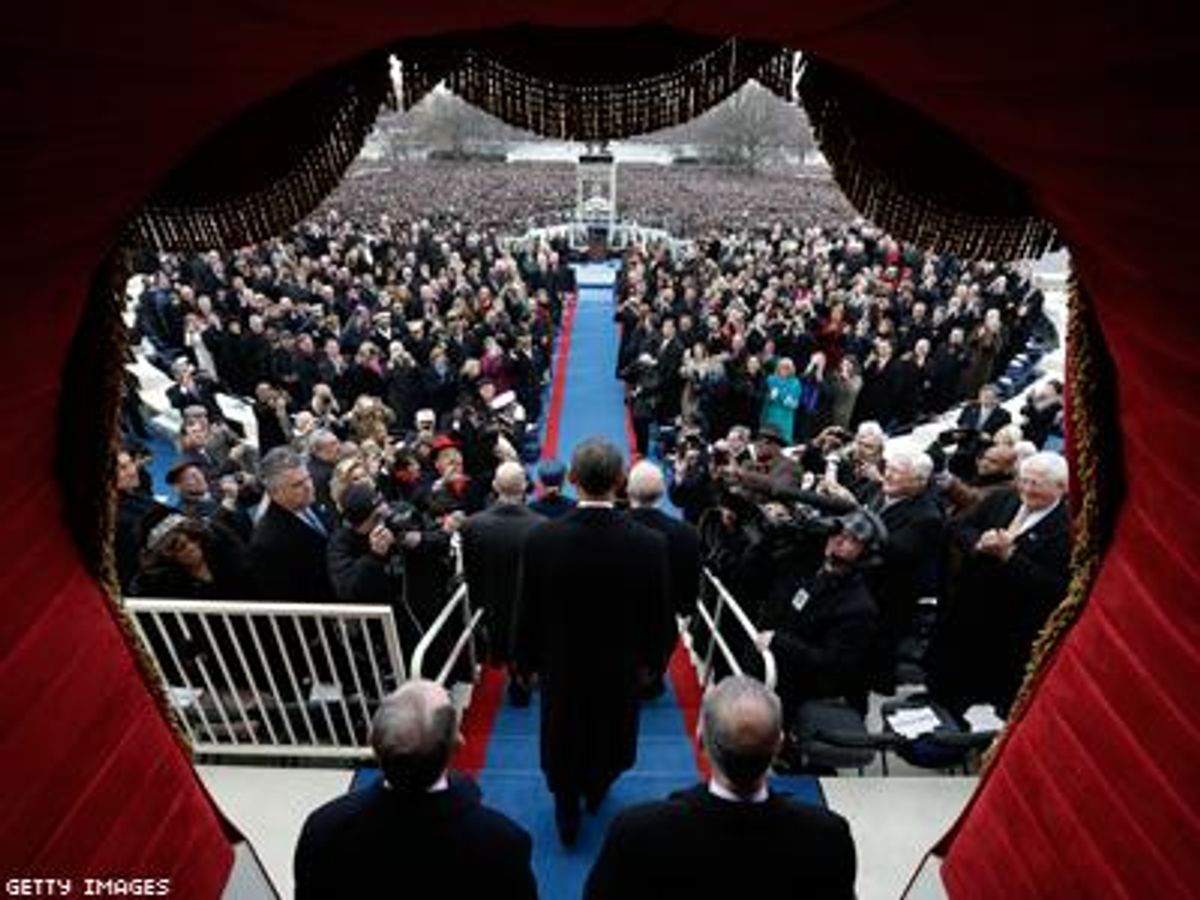It's the morning after President Obama's second inauguration, and I'm still buzzing. History was made over and over throughout the ceremony, with unparalleled examples of calls for the legal and social recognition of the human rights of LGBTs.
"Our journey is not complete until our gay brothers and sisters are treated like anyone else under the law, for if we are truly created equal, then surely the love we commit to one another must be equal as well," Obama said. And audible cheers echoed across the Mall, and what appeared to be a zillion little flags waved all around the reflecting pool. And I had to reach for a tissue, in case the lump in my throat turned into tears of happiness.
The significance of an inaugural address cannot be overstated. Though much of what a president says is recorded for posterity, the inaugural address is instantly an important historical document, virtually carved in stone for future generations to read and study. And of course the televised event is seen across the country and the globe. Obama chose his words carefully, certainly, and took the opportunity to speak to the generations about, among other things, the American principles of equality.
"We, the people, declare today that the most evident of truths -- that all of us are created equal -- is the star that guides us still, just as it guided our forebears through Seneca Falls and Selma and Stonewall," the president said.
By saying "Stonewall," referring to the 1969 demonstration in a burgeoning American LGBT rights movement, in the same breath as Seneca Falls, an early and crucial women's rights conference in 1848, and Selma, the site of an attack by state troopers on civil rights marchers in Alabama in 1965, the president is declaring for all the world that the rights fought for in all of those struggles are human rights. That one group's struggles often build on the victories won by our forebears in other movements, and that we are people, not special interest groups.
Consider the audience; as if a global audience of well-wishers were not enough, Obama spoke these words within arm's reach of the justices of the United States Supreme Court, who will be deciding matters of the constitutionality of our rights in the coming months. He spoke these words mere feet from some of his most strident political opponents, and in doing so drew sharp lines between his view and their intransigence on LGBT rights. And he said it to an audience of people devoted to civil rights, many of whom, since he has spoken out in favor of LGBT equality, are now viewing our struggle for rights in the same context as women's rights and the struggle for racial and ethic parity.
The effect of this inaugural address and the whole ceremony are a reminder of American values, a reminder that we do not seek to value one person more highly than another, that we do not determine that some of our citizens deserve equality but some others need not have access to the rights and privileges of citizenship. It was, for me, an unparalleled moment of patriotism, and the thrill of the day made me forget my aching feet and useless mobile devices (among the lessons learned for future inaugurations: comfy shoes, forget about live-tweeting).
Obama pins, scarves, hats, shirts, embroidered and bedazzled jackets, painted coats, earmuffs, and other memorabilia, both imaginative and inane, were on display throughout the city and for sale on every street corner. I attended the inauguration with a number of people, from colleagues to campaign donors to politics junkies, and we each remarked many times about the kindness and patience of all our fellow celebrants and spectators throughout the weekend. And when close to a million people gather together in our country's front yard for a big event, patience could easily have been worn thin. But it wasn't.
Strangers from all parts of the country, black and white and Asian and Latino and Native American, introduced themselves to one another, shared stories about discrimination they'd experienced, or lessons of love and tolerance passed down through generations, or the thrill of sharing in the historic event.
I had so many illuminating conversations. In a way I had truly never experienced before, many straight, older celebrants spoke to me directly about their understanding of the struggles LGBTs face. While the language in our conversations was sometimes coded, sometimes a bit stifled (there was occasionally a "your people" wording from some who are still ill at ease with the terms we use to describe our communities), I found that I could easily overlook that unease because we were speaking the same language, even when we lost the words. We were talking about fairness, how far we've come, and how far we have yet to travel, and we understood one another. And our president has been vitally important in bringing many of those people to this understanding of our common desire for fairness. Coalitions are building.
This ceremony was my first to attend, and I wonder if the bar for inclusion, diversity, and progressive values at an inauguration was set so high that I may never live to see the likes again. But then, a few short years ago, I wouldn't have anticipated hearing any president speak as ours did on Monday, January 21, 2013.
We have miles to go and much to accomplish before our journey is ended -- especially with regard to transgender rights, sadly not an explicit part of the address -- and we must continue to push Obama, as he has asked us to do, to accomplish our goals. As we push and march and speak and lobby and mobilize for our rights, I know we have a president who is our fierce advocate.














































































